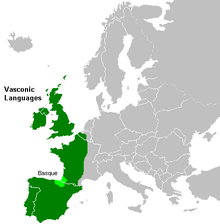Vasconic substrate hypothesis
The Vasconic substrate hypothesis is a proposal that several Western European languages contain remnants of an old language family of Vasconic languages, of which Basque is the only surviving member. The proposal was made by the German linguist Theo Vennemann, but has been rejected by other linguists.

According to Vennemann, Vasconic languages were once widespread on the European continent before they were mostly replaced by Indo-European languages. Relics of these languages include toponyms across Central and Western Europe.
Theory
Theo Vennemann (2003) proposes that after the last Ice Age, Vasconic people (perhaps coming from Africa) resettled all of Western Europe. They gave names to the rivers and places. These names often persisted after the Vasconic languages were replaced by Indo-European languages in most of their area. The present Basque area in northern Spain and southern France is postulated to be a relic.
In support of this argument, Vennemann cites, inter alia:
- cultural similarities noted by Marija Gimbutas;
- parallels in geographical toponyms which may be relics of a pre-Indo-European substratum, including
- numerous examples from Old European hydronymy and maritime terminology, noted by scholars such as Hans Krahe, that do not necessarily have an Indo-European root, such as words in West Germanic languages for "sea" (Dutch zee) and "ice" (Dutch ijs) that are similar to their respective Basque counterparts, i.e. itsaso and izotz,
- the similarity of names like Val d'Aran, Arundel, and Arendal to (for example) the Standard Basque word haran "valley";
- other linguistic elements, especially
- evidence from genetics and blood types, which show that the modern Basque people share physical characteristics with old populations throughout Western and Central Europe, especially in likely refugia areas, such as mountain ranges.
Vennemann developed his ideas in a series of papers which were collected in a book called Europa Vasconica - Europa Semitica. A long critical review of this appeared in Lingua 116.[1]
Reception
The hypothesis has been largely rejected by historical linguists. Vennemann's theories on "Vasconic" toponymy and hydronymy were opposed by linguists such as P. R. Kitson (1996),[2] and Baldi & Richard (2006), who pointed out that most linguists see unusual European hydronyms as more likely to have Indo-European roots of some kind.[1] German linguist Dieter H. Steinbauer argued that it is difficult to argue on the basis of Basque because:
- its status as an isolate means that there is insufficient historical data for the reconstruction of the substratal language and;
- Basque itself has adopted many words from Indo-European languages.
Steinbauer also criticised Vennemann for
- assuming that a Vasconic substratal language would necessarily share with Basque a feature of root words with initial consonant clusters;
- ignoring indications that the ancient Etruscan language seems more closely related to western Anatolian languages, and for
- several methodological flaws, concluding that "a scientific discourse with Vennemann must face insurmountable obstacles".[3]
See also
- Atlantic (Semitic) languages
- Atlantic Bronze Age
- Aquitanian language
- Bronze Age in Europe
- Indo-European substrate hypotheses
- Neolithic Europe § Language in the Neolithic
- Old European hydronymy
- Origin of the Basques § Old European
- Pre-Roman peoples of the Iberian Peninsula
- Proto-Basque
- Urbian
- Dené–Caucasian languages
References
- Baldi, Philip; Page, B. Richard (December 2006). "Europa Vasconica-Europa Semitica". Lingua. 116 (12): 2183–2220. doi:10.1016/j.lingua.2005.03.011.
Abstract: In this review article we evaluate Theo Vennemann's provocative theories on the role of Afroasiatic and Vasconic (e.g. Basque) languages in the pre-historic development of Indo-European languages in Europe as presented in the volume Europa Vasconica-Europa Semitica, a collection of 27 of Vennemann's essays...
- P.R. Kitson; British and European River-Names in Transactions of the Philological Society 94, 73-118 (1996).
-
- (in German) Dieter H. Steinbauer: Vaskonisch - Ursprache Europas? In: Günter Hauska (ed.): Gene, Sprachen und ihre Evolution. Universitätsverlag, Regensburg 2005. ISBN 3-930480-46-8
- Alfred Bammesberger, Theo Vennemann: Languages in prehistoric Europe. Winter, Heidelberg 2003, 319-332. ISBN 3-8253-1449-9
- Theo Vennemann; Europa Vasconica - Europa Semitica, Berlin 2003.
- (in German) Theo Vennemann: Zur Frage der vorindogermanischen Substrate in Mittel- und Westeuropa. In: Patrizia Noel Aziz Hanna (ed.): Europa Vasconica. Trends in Linguistics. Studies and Monographs. Bd 138. Europa Semitica. de Gruyter, Berlin 2003, 517-590. ISBN 3-11-017054-X
- (in German) Theo Vennemann: Basken, Semiten, Indogermanen. Urheimatfragen in linguistischer und anthropologischer Sicht. In: Wolfgang Meid (ed.): Sprache und Kultur der Indogermanen. Akten der X. Fachtagung der Indogermanischen Gesellschaft, 22.-28. September 1996. Innsbrucker Beiträge zur Sprachwissenschaft. Bd 93. Innsbruck 1998, 119-138. ISBN 3-85124-668-3
- (in German) Elisabeth Hamel, Theo Vennemann: Vaskonisch war die Ursprache des Kontinents. In: Spektrum der Wissenschaft. Spektrumverlag, Heidelberg 25.2002,5,32ff. ISSN 0170-2971
External links
- Personal homepage of Theo Vennemann
- Theo Vennemann's page at University of Munich
- Review of Theo Vennemann's collection of articles, Europa Vasconica - Europa Semitica, by Hayim Sheynin via LINGUIST List 15.1878 (June 21, 2004)
- Review of Theo Vennemann's Europa Vasconica-Europa Semitica, by Philip Baldi and B. Richard Page, in Lingua, volume 116, issue 12, December 2006.